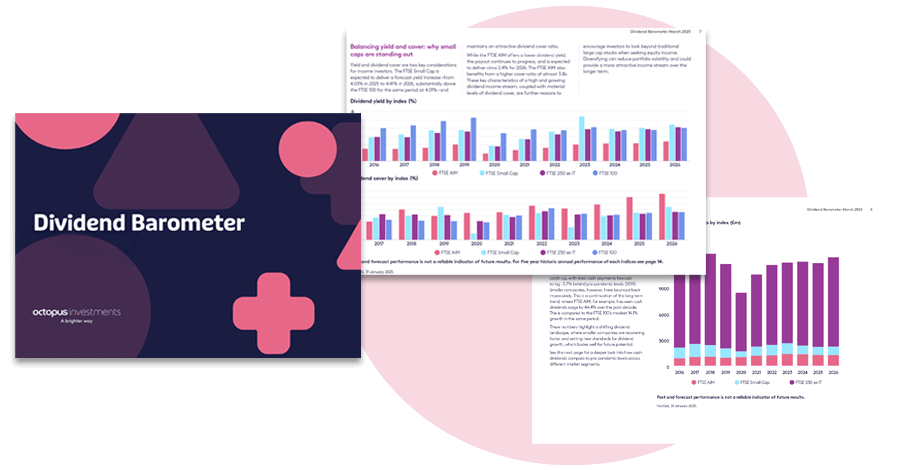Last week, Octopus Investments and the London Stock Exchange Group (LSEG) hosted an event at the House of Commons to celebrate thirty years of the Alternative Investment Market (AIM). The event brought together MPs, AIM-listed companies, and investors to reflect on AIM’s contribution to innovation, job creation, and regional growth while exploring how to strengthen its impact over the next three decades.
Driving regional growth
Opening the event, Callum Anderson MP for Buckingham and Bletchley, paid tribute to the success of AIM, commending its “vibrant ecosystem and the role it has played and continues to play in enabling UK businesses to raise the vital capital required to scale and blossom into homegrown success stories.”
Over the past three decades, AIM has become Europe’s leading growth market and a core part of the UK’s financial landscape, helping more than 4000 companies raise over £136 billion1. It has supported founders across key sectors in transforming innovative ideas into thriving, sustainable businesses. The companies attending the event reflected AIM’s diversity, spanning sectors from defence, life sciences, construction, and technology through to some of the nation’s favourite beverage producers.
Crucially, AIM has become a vital source of capital for driving growth beyond London and the South-East, bringing “the skills, jobs, the investment and livelihoods that so many communities across the UK rightly require” across the regions, as noted by Anderson.
AIM: A crown jewel of the UK’s capital markets
Next, Julia Hoggett, CEO of the London Stock Exchange, took to the stage to emphasise AIM’s pivotal role in the UK’s capital markets and its contribution to economic growth. Commenting on AIM’s unique ability to connect businesses with the patient, long-term capital that is needed to grow, Julia remarked:
“Our rate of starting businesses as a nation is superb. According to the Scale-Up Institute’s data we are third in the world, but we are 13th in the world at generating scaling businesses. AIM has always been a critical part of how we help finance those companies and close that gap2.”
Expanding on this, Julia noted:
“Starting and scaling companies require taking risks. The UK must continue to incentivise the deployment of risk capital and support business builders. The prize? Jobs, profits, and tax revenues, that will help steer the UK’s growth agenda.”
Powering long-term patient capital
Chris Hulatt, Co-Founder of Octopus Investments, reflected that while AIM has been home to household names and companies that have gone on to list on the main market, many of its businesses are lesser known yet still leaders in their fields. One such example is Renew Holdings plc, an infrastructure business listed on AIM since 2001, which has achieved sustained profit growth over two decades3. Renew carries out essential maintenance work on critical infrastructure – from nuclear and rail projects to the restoration of the of roof at the Houses of Parliament – powerfully demonstrating the tangible impact of patient capital on the backbone industries of the UK economy.
As Chris put it, “This is economic growth in action. A successful market allows companies to raise finance, do acquisitions, build scale, offer liquidity for shareholders, and create high quality jobs.”
While there is much to celebrate, Chris also acknowledged the challenges currently facing AIM, including the steady decline in institutional investment in smaller UK companies, reduced retail participation due to changes in Business Relief, and the growing number of takeovers by international buyers at lower valuations.
To help address these headwinds, he called for greater collaboration between government, investors, and the market, proposing measures such as expanding investment limits for VCTs and EIS and encouraging pension funds to allocate more capital to AIM-listed businesses. He stressed that “no single measure in isolation would be a silver bullet,” but that a combination of actions is needed “to create the conditions to allow for AIM to kick on here from here and remain vibrant for the future.”
Looking ahead for AIM
Closing the event, Lucy Rigby MP, and Economic Secretary to the Treasury, looked ahead for the future of AIM, reaffirming the government’s commitment to strengthening the UK’s capital markets as a central driver of economic prosperity. She praised AIM’s impact, which has accounted for over half of all growth capital raised in Europe over the past decade and supports hundreds of thousands of UK jobs4.
Rigby outlined a series of government reforms that are being delivered to boost competitiveness and reduce red tape, including updates to listing and prospectus rules, and initiatives such as the Mansion House Accord, which encourages pension funds to invest in UK growth assets. Looking ahead, she said AIM’s next decade should be a “golden one”, driven by a “strong, collaborative partnership between industry and government” to ensure the market continues to thrive for the next thirty years and beyond.
1. Celebrating 30 Years of AIM, The London Stock Exchange, 2025
2. Annual Review 2024 Highlights, The Scale-Up Institute, November 2024
3. Renew Holdings PLC, London Stock Exchange, October 2025
4. London Markets Update – 5th Edition 2025, LSEG, June 2025










